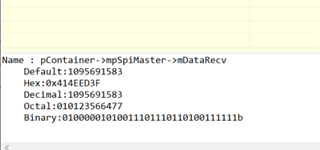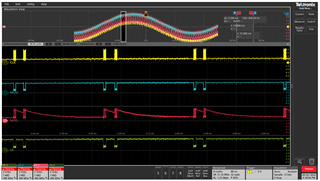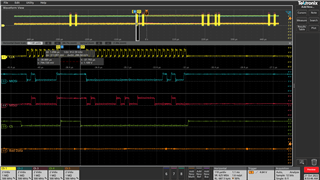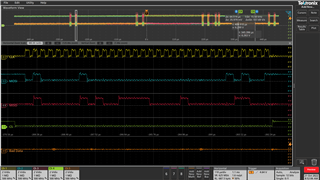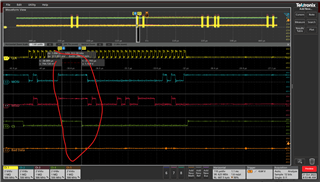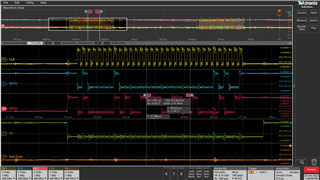Other Parts Discussed in Thread: PGA411-Q1
Hello,
I have my project mostly working with the TMS320F280039C and just a couple issues are holding me back from going to testing with this microcontroller. I am using the MCU to control an AC motor and have the motor spinning. The way my project is structured I have a 250us ADC interrupt that fires and does my motor control. This interrupt then fires off a user interrupt that runs for 100us (note that the added 100us must be less than 250us total). During the 250us interrupt I use SPI FIFO interrupts to read my resolver twice. This is working well, but I seem to be getting some bad data back causing noise in my speed feedback and an audible noise in my motor sometimes since I am firing current at the incorrect spot.
Below Conv1Debug3 shows a count of bad data on the SPI link - as can be seen in 1.5s I missed 14 transfers from my resolver and you can also notice the accompanying glitches in speed:
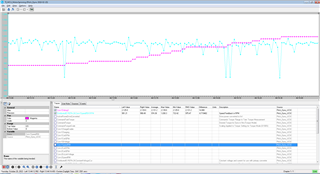
I wonder if this is a nested interrupt issue?
I am starting a SPI transfer like this - note that I had to add EINT to allow 2 SPI interrupts during my ADC ISR.
// Start sequence of SPI Master read/write register operations to Resolver chip - Blocking
void SpiMaster_StartTransfer(GE_Primary_Container_t *pContainer, uint32_t command)
{
pContainer->mpSpiMaster->mDataRecv = 0;
// Reset Rx and Tx Buffers
SPIMaster_ResetBuffers(pContainer);
// Set TxData buffer
pContainer->mpSpiMaster->mTxData[0] = (command >> 24) & 0xFFU;
pContainer->mpSpiMaster->mTxData[1] = (command >> 16) & 0xFFU;
pContainer->mpSpiMaster->mTxData[2] = (command >> 8) & 0xFFU;
pContainer->mpSpiMaster->mTxData[3] = (command & 0xFFU);
pContainer->mpSpiMaster->mIsTransferCompleted = false;
// Reset / Setup SPI
SPIMaster_SetupResetSPI(pContainer);
// Reset / Setup FIFO
SPI_disableFIFO(REPC_RES_DSPI_MASTER_BASEADDR);
SPI_clearInterruptStatus(REPC_RES_DSPI_MASTER_BASEADDR, SPI_INT_TXFF);
SPI_clearInterruptStatus(REPC_RES_DSPI_MASTER_BASEADDR, SPI_INT_RXFF);
SPI_enableFIFO(REPC_RES_DSPI_MASTER_BASEADDR);
SPI_setFIFOInterruptLevel(REPC_RES_DSPI_MASTER_BASEADDR, SPI_FIFO_TXEMPTY, SPI_FIFO_RX4);
// Enable RxFIFO Interrupt
SPI_enableInterrupt(REPC_RES_DSPI_MASTER_BASEADDR, SPI_INT_RXFF);
// Enable SPI
SPI_enableModule(REPC_RES_DSPI_MASTER_BASEADDR);
// Clear INTM so that we can trigger another interrupt inside of fast thread
EINT;
// Enable interrupts
Interrupt_enable(INT_SPIB_TX);
Interrupt_enable(INT_SPIB_RX);
// Fill FIFO and send data - no interrupt required here
int i = 0;
for (i = 0; i < REPC_RES_MASTER_TRANSFER_SIZE; i++)
{
SPI_writeDataNonBlocking(REPC_RES_DSPI_MASTER_BASEADDR, ((pContainer->mpSpiMaster->mTxData[i] & 0x00FF) << 8));
}
}
This is how I have the SPI initialized:
// Setup / Reset SPI
void SPIMaster_SetupResetSPI(GE_Primary_Container_t *pContainer)
{
// Must put SPI into reset before configuring it
SPI_disableModule(REPC_RES_DSPI_MASTER_BASEADDR);
// SPI configuration. Use a 12.5MHz SPICLK and 32-bit word size, 25MHz LSPCLK
// Rising edge SPI
SPI_setConfig(REPC_RES_DSPI_MASTER_BASEADDR, REPC_RES_DSPI_MASTER_CLK_SRC, SPI_PROT_POL0PHA0,
SPI_MODE_MASTER, REPC_RES_TRANSFER_BAUDRATE, 8U);
SPI_disableLoopback(REPC_RES_DSPI_MASTER_BASEADDR);
SPI_setEmulationMode(REPC_RES_DSPI_MASTER_BASEADDR, SPI_EMULATION_FREE_RUN);
}
// Init SPI1 Interface to resolver
void SPIMaster_Init(GE_Primary_Container_t *pContainer)
{
// Register interrupt ISRs
Interrupt_register(INT_SPIB_TX, &spiBTxFIFOISR);
Interrupt_register(INT_SPIB_RX, &spiBRxFIFOISR);
// Setup / Reset SPI
SPIMaster_SetupResetSPI(pContainer);
// Configuration complete. Enable the module.
SPI_enableModule(REPC_RES_DSPI_MASTER_BASEADDR);
// Init Master Buffers to 0
SPIMaster_ResetBuffers(pContainer);
// Init Control Variables
pContainer->mpSpiMaster->mIsTransferCompleted = false;
}
Thanks for the help!


